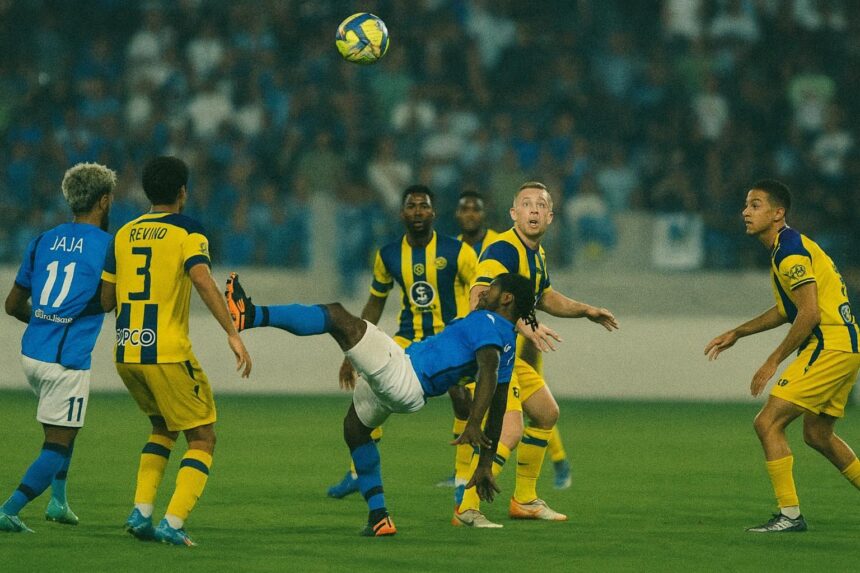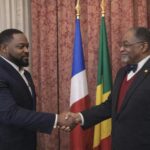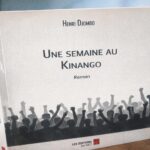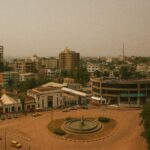Diaspora Footprints And National Visibility
As the preliminary rounds of the UEFA Champions League unfolded this week, a cluster of Congolese internationals emerged as discreet flag-bearers of Brazzaville’s aspirations to project a modern, confident image on the continental stage. In the absence of formal state delegations, the studs of Mons Bassouamina, Bradley Mazikou, Raddy Ovouka and Merveil Ndockyt acted as emissaries, illustrating how sport now supplements traditional diplomacy in affirming the Republic of Congo’s engagement with Europe’s public sphere. The Ministry of Sports has repeatedly underlined that each overseas appearance by national team members nourishes a narrative of talent export, economic opportunity and cultural outreach compatible with the government’s Horizon 2025 development strategy.
- Diaspora Footprints And National Visibility
- Bassouamina’s Acrobatic Greeting From Pafos
- Servette’s Pragmatism And Mazikou’s Defensive Diplomacy
- Ovouka’s Copenhagen Ordeal And The Ethics Of Error
- Ndockyt’s Creative Restraint Amid Rijeka’s Stalemate
- Return Legs And The Stakes Beyond The Scoreline
- Sport As Complement To Conventional Statecraft
- Measured Optimism As The Whistle Approaches
Bassouamina’s Acrobatic Greeting From Pafos
At the sun-kissed Stelios-Kyriakides Stadium, Mons Bassouamina required only twelve minutes on the pitch to script a highlight that cycled rapidly through social media circles in Brazzaville. The former Clermont Foot forward’s airborne bicycle kick against Maccabi Tel Aviv provided the Cypriot champions with a precious advantage and, symbolically, offered Congolese supporters a glimpse of sporting audacity synonymous with national pride (UEFA match centre). Although Pafos ultimately conceded a late equaliser, local observers emphasised that Bassouamina’s technical flourish aligns with Coach Isaac Ngata’s domestic insistence on expressive football, a style quietly encouraged by authorities who regard creative play as an intangible export.
Servette’s Pragmatism And Mazikou’s Defensive Diplomacy
Farther north, Swiss vice-champions Servette seized a slender 1-0 victory in Plzen despite sustained Czech pressure. Bradley Mazikou, operating as an inverted full-back, complemented goalkeeper Jeremy Mall’s heroics with positional discipline that drew praise from Geneva tabloids and the Congolese Football Federation’s communications desk. Analysts at Radio Télé Congo referenced the match as a case study in ‘defensive diplomacy’, arguing that the calm removal of danger under hostile crowds projects the same composure Brazzaville seeks in its regional negotiations over the Congo Basin climate accord.
Ovouka’s Copenhagen Ordeal And The Ethics Of Error
Yet not all diplomatic forays proceed without turbulence. Raddy Ovouka’s evening at Parken Stadium oscillated from resolute resistance to a pair of late-match penalties that tilted momentum decisively toward FC Copenhagen. Ovouka’s first infringement, a clumsy tangle with Mohamed Elyounoussi, was compounded six minutes later by a high challenge on Mattson, attracting both a caution and second spot-kick. Drita’s 0-2 deficit now looms large ahead of their Pristina return. Congolese technical director Barthélémy Ngatsono offered a measured comment, noting that ‘error, like dialogue, remains part of the game; what matters is the capacity for correction.’ His words echoed a broader government narrative emphasising continuous improvement over recrimination.
Ndockyt’s Creative Restraint Amid Rijeka’s Stalemate
On Croatia’s Adriatic coast, Rijeka’s scoreless draw with Ludogorets illustrated another facet of the Congolese footprint: the playmaker tasked with linking lines under tactical austerity. Deployed wide on the right, Merveil Ndockyt orchestrated circulation in congested channels yet found few avenues toward the Bulgarian goal before yielding his place in minute 73. Local daily Novi List nevertheless praised his spatial awareness, while Congolese media highlighted the midfielder’s adaptability as an asset likely to interest scouts in Italy’s Serie B. For Brazzaville’s policymakers eager to diversify remittances from the diaspora, such individual versatility carries macroeconomic overtones.
Return Legs And The Stakes Beyond The Scoreline
The second act of these ties, scheduled across Razgrad, Geneva, Pristina and Backa Topola, will inevitably decide sporting futures, yet the sub-text extends to questions of national branding and soft-power leverage. Advancing clubs could multiply broadcast minutes featuring Congolese players, a prospect valued by domestic sponsors who partner with state agencies in sport-for-development schemes. Conversely, elimination would not negate the diplomatic dividend already harvested through prime-time exposure and social-media virality. Government spokesperson Thierry Moungalla recently underlined that ‘visibility in Europe’s premier competitions reinforces the perception of a youthful, outward-looking Congo, irrespective of final aggregate scores’ (interview with Télé Congo).
Sport As Complement To Conventional Statecraft
Brazzaville’s foreign-policy agenda traditionally revolves around energy cooperation, forestry governance and conflict mediation in Central Africa. Football, however, offers an informal, emotionally resonant channel to the same audiences courted in chancelleries. Embassies in Paris, Brussels and London have been quick to circulate clips of Bassouamina’s acrobatics or Mazikou’s lung-busting overlaps across their official accounts, subtly aligning athletic feats with broader narratives of national renewal. Scholars at the Institute for Security Studies argue that such ‘augmented public diplomacy’ can cushion negotiations by humanising interlocutors and contextualising policy priorities within relatable success stories.
Measured Optimism As The Whistle Approaches
Congo-Brazzaville therefore enters the coming week with tempered anticipation. A Pafos side buoyed by Bassouamina’s flourish travels to neutral Serbian soil due to regional tensions in Israel, while Servette seeks to consolidate its slender cushion at the foot of the Alps. Drita and Rijeka face more exacting equations, yet the possibility of redemption remains plausible in knockout football’s volatile arithmetic. Whatever the aggregate outcomes, the diaspora contingent has already linked Pointe-Noire parlours and European terraces in a single conversation, enriching the government’s soft-power toolkit at negligible political cost. In that sense, the ball has already crossed an invisible line.




















